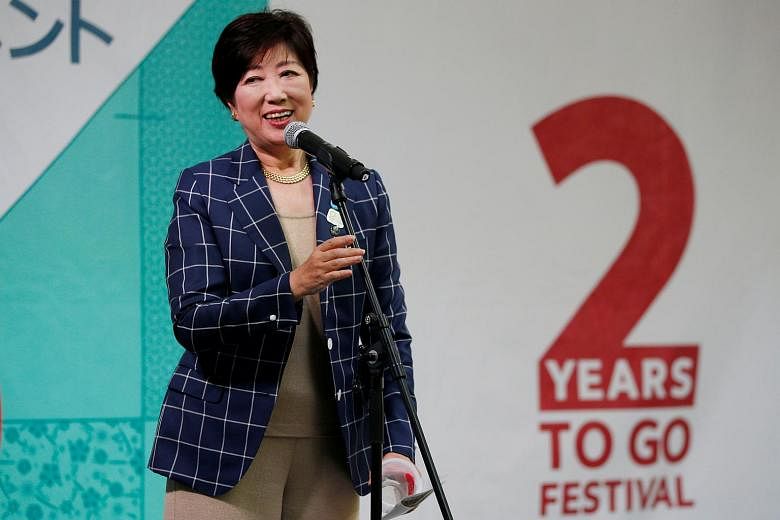TOKYO (Reuters) - With no platform, no party leader and not even a formal name, a nascent political party linked to popular Tokyo Governor Yuriko Koike is preparing for a snap election that Japanese Prime Minister Shinzo Abe is expected to call for next month (Oct).
Ms Koike, 65, is a former ruling party lawmaker often mentioned as a possibility to become Japan's first female premier. In a Tokyo Metropolitan Assembly election in July, she adeptly exploited voters' longing for a viable alternative to Abe's conservative Liberal Democratic Party in handing the LDP an historic defeat.
Now her allies hope to use Koike's political star power and reformist message to replicate that success nationally in the lower house. Sceptics say achieving that could be tough and a more likely outcome is her new group stays a Tokyo-based force.
Koike, a media-savvy former TV announcer who defied the LDP to run for governor last year, has said she's focused on her current job, including preparing for the 2020 Tokyo Olympics, although she has not ruled out returning to parliament.
"There are unexpected things and expected things, and while watching the situation, I want to consider what is best for Tokyo and the nation," she told reporters on Wednesday when asked if she'd run for parliament's lower house.
She also dodged a question as to whether she would lead the new party formally.
Koike's allies had planned to launch the new party by year's end but were caught off guard by Abe's decision, expected to be officially announced next Monday, to call an Oct 22 general election.
"We are working on the party's policies, a name and by-laws," Goshi Hosono, a former environment minister who is among those working to launch the new party, told reporters this week.
Hosono, 46, is one of several lawmakers who have bolted the struggling opposition Democratic Party, disappointed by its failure to capitalise on voter distaste for suspected cronyism scandals and perceived arrogance that sent Abe's ratings tumbling in July.
Abe's support has since recovered to about 50 per cent.
Koike ally Masaru Wakasa, a former prosecutor who recently left the LDP, last month launched a political group called"Nippon First" (Japan First) but it has not registered as a party or picked a name.
Many voters are dissatisfied with both the long-ruling LDP and the Democrats, a mixed bag of conservatives and liberals whose image was tarnished by their rocky time in power from 2009 to 2012. Independents have stayed home in droves in the four national elections since 2012, when Abe returned to office.
Forty-five percent of respondents to a Yomiuri newspaper poll this month backed no party - more than the 40 percent who supported the LDP. Only 5 percent favoured the Democrats.
Forty-one percent expressed hopes for a Koike party. But turning those hopes into votes is not guaranteed.
Wakasa told reporters the embryonic party aims to run more than 60 candidates, including 25 in Tokyo. It won't have formal support from the LDP's coalition partner, the Komeito, which backed Tokyo Citizens First candidates in July's Tokyo poll.
Candidates will likely include former and incumbent lawmakers and political novices who heard Koike lecture at Wakasa's "cram school" for would-be lawmakers last weekend.
Wakasa has said the new party will be "conservative". Some expected members favour revising the post-war Constitution's Pacifist Article 9 - a controversial but cherished goal of Abe.
Wakasa has suggested an amendment to create a unicameral legislature, an idea which might not resonate with most voters.
"The question is, how would a new party differentiate itself from the LDP," Akihisa Nagashima, a former Democrat who may join the group, told Reuters earlier this year.
Japan has seen numerous new parties over the decades. Most fizzled. Koike herself entered politics in the now-defunct Japan New Party, whose leader Morihiro Hosokawa headed an anti-LDP ruling coalition in the early 1990s that soon crumbled. She joined several new opposition parties before turning to the LDP.
Political analysts said early forecasts were risky and much depended on media coverage and whether Koike heads the party or surprises by running for parliament. The latter is seen as unlikely given a possible voter backlash for abandoning her post as Tokyo governor. "I don't think (the new party) will live up to all the fuss," said Nihon University professor Tomoaki Iwai.
The LDP currently has 288 seats in the 475-member lower house, while the Komeito has 35, giving them a two-thirds "super majority". The Democrats have 88 seats. Reforms enacted last year will cut the number of seats to 465 from 475.

